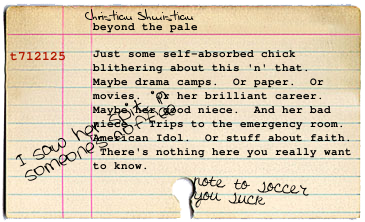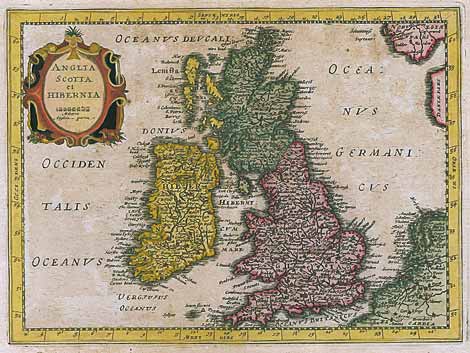I'm fond of Saturday mornings. I rise a half hour or so later than usual. I make strong tea which I take sweetened with rich (soy) milk and toast which I drizzle with olive oil. I open Firefox and see what the week has brought in my two favorite cultural aggregators:
Arts and Letters Daily and
Arts Journal Daily. I like what I find.
This day for example ALD points me to articles on (a) the difference in average IQ scores of African-Americans and non-African-Americans, (b) how "macro" economics works (or doesn't), (c) what is it with Chinese culture and politics?, (d) the supposed fall of American conservatism, and (e) the question, "Why is the Universe Just Right for Life?" And AJ cites articles and reviews of Tom Stoppard's new play, Voyage, first in the “The Coast of Utopia,” trilogy, a massive undertaking.
All are interesting, generally witty, give information that's new to me, and stimulate thoughts -- I like thoughts to be stimulated.
First, from Reason Magazine, which I think is a bastion of libertarianism - a review article by Ronald Bailey on
Closing the Black/White IQ Gap which outlines the work of two men: James Flynn and Charles Murray, arguing about whether Black/White differences result from nurture or nature and whether they (the differences) are declining. He concludes that neither man makes a persuasive case and gives his own opinion (libertarian I suppose) that "no matter who turns out to be right in the nature versus nature debate over why there is a gap in black/white IQ scores, the idea that we must strive to treat every person as an individual, not as a representative of some group or other, seems right to me." The piece reminds me of my experience in the 1970s "war on poverty" where it was my personal experience that main beneficiaries of this government program were middle-class members of minority groups. The poor benefitted to the extent these middle-class folk permitted -- some a great deal where they were altruistic, others not at all where they were exploitive. Some extracts:
What are the public policy implications of the black/white IQ test score gap? As a self-avowed socialist, Flynn is in favor of dramatically expanding all sorts of color-blind state interventions. For example, he wants government drop-in centers where parents of every race and class could bring their children for educational enrichment. He also said that he wanted to see more book clubs in the black community. Murray, on the other hand, does not believe that there is much evidence that government educational interventions beyond some reasonably adequate level can permanently boost IQ test scores. Murray’s preferred policy is to forget group averages and encourage private and public institutions to treat people as individuals.
Next, from InTheseTimes, an article on
What We Learn When We Learn Economics, subtitled "Is a little economics a dangerous thing?" by Christopher Hayes, who makes things very simple: The objective is prosperity. Governments want it as much as individuals do. What can governments do to achieve it? The question has been kicked around for centuries. I like to think about its origins in the seventeenth century and its superbe treatment by Adam Smith in the next one, but Hayes focuses on the modern opposition of Keynseians and Chicagoists. He begins:
There’s a case to be made that the single most intellectually and politically influential neighborhood in the United States is Chicago’s Hyde Park. Integrated, affluent and quiet, the 1.6 square-mile enclave on the city’s south side is like a tiny company town, where the company happens to be the august, gothic, eminently serious University of Chicago. Students at the U. of C. sell T-shirts that read “Where Fun Goes To Die,” and the same could be said of the neighborhood, which until very recently had a bookstore-to-bar ratio of 5:2.
This doesn't have anything to do with the article, but it's a nice quote. The core of what he says:
Among elites in economics and politics the consensus was, as John Maynard Keynes had argued, that capitalism could only function with regular and robust government management. Indeed, so total was this consensus that in 1971 Richard Nixon announced a plan to impose wage and price caps in order to curb inflation, declaring, “We are all Keynesians now.” Just 25 years later, however, Bill Clinton, the first Democratic president to be re-elected since FDR, announced that the “era of big government is over.” He might as well have said, “We are all Chicagoans now.” [These Chicagoans told of] the inefficiencies associated with non-free-market solutions and the perverse incentives that made any social programs destined to fail. [And, through their agency,] arguments about the way the world should be were converted into assertions about how the world actually was. Or, to put in terms that economists favor, normative arguments became positive ones. [In sum:] a David Barry quote: “Democrats seem to be basically nicer people, but they have demonstrated the management skills of celery. Republicans would know how to fix your tire, but they wouldn’t stop.”
Third, from the New Republic, a
review by Andrew J. Nathan of the book,
Mao's Last Revolution, by Roderick Macfarquhar, which is about the difficulty, maybe impossiblity of understanding the Cultural Revolution which Mao inflicted on his countrymen. Best quote from this piece: "As soon as Mao was gone, his project was abandoned. China set course toward wherever one thinks it is heading: capitalism, market socialism, export-led mercantilism -- certainly toward a society obsessed with selfish wealth." With my bias toward seventeenth-century political economy, I'm interested in the idea that the current Chinese revolution is a type of export-led mercantilism. But Nathan's main point is that China can't be assumed to be Westernizing (in the Japanese or any other manner). He says: 'Hard as it is to believe after reading this masterful and sickening book, large parts of Mao's vision still live. The dominant voices among independent intellectuals in China today belong not to liberal democrats and human rights activists, but to so-called neo-conservatives and neo-leftists who believe that even though Mao's revolution failed (through a combination of his mistakes and Western cultural and economic subversion), the search for a distinctive Chinese model should continue. Some of these ideas even animate the current leadership's push for a so-called "harmonious society," which aims to use state control to repress social conflict and ease inequality. The Cultural Revolution was Mao's last revolution, but it may not have been China's.'
Fourth, from PhysicsWeb, another book review,
Seeking anthropic answers by Andrew Jaffe. The book:
The Goldilocks Enigma: Why is the Universe Just Right for Life? by Paul Davies. The aspect that caught my attention relates to evidence. There isn't enough of it, making discussion of this topic highly speculative. It reminds me again of the seventeenth century when men began to question premises on which were based the huge superstructure of abstruse thought that had been accumulating since (at least) the time of Aristotle.
An aside: One of my current reads is
The correspondence of Spinoza by Abraham Wolf. Henry Oldenburg, secretary of the Royal Society, correspondended extensively with Spinoza. There's much of great interest, at least to me, in their exchanges, but, relevant here, Oldenburg takes Spinoza to task for his attempt, using algebra, to build a universal ethics -- one based on what Spinoza believed to be unshakeable, 100% self-evident propositions (or, as Spinoza had it, impregnable definitions). Oldenburg, with flowery politesse and infinite tact, says hooey. This and other aspects of the exchange show the difficulty that the new mathematicians and natural philosophers faced in attempting to introduce new patterns of thought, new procedures for testing truth, and new ways of communicating with each other (moving away from the ancient pattern of bi-polar debate -- as between lawyers in a court proceeding, which could be entertaining -- and that was often the point, but which was less likely to advance knowledge than the more collaborative model that was emerging to replace it).
So, reviewer Jaffe points out that physics hasn't provided data sufficient for answering the question that's the book's title -- or even deciding whether the question frames the subject in a way that permits answer. Jaffe concludes using an argument that I've treasured ever since I first learned of its expression by The Buddha. He, Jaffe, says: "We have circled round to something philosophers have been worrying about for longer than physicists: how can I be sure I am not just a "brain in a vat"? This strain of scepticism started with Descartes and was only quashed by Ludwig Wittgenstein and his followers in the last century. Wittgenstein famously said, "Whereof one cannot speak, thereof one must be silent", and perhaps, in the absence of better theories and data to support them, that is how physicists should treat anthropic questions." For a concise description of The Buddha's teaching on this see
here.
The
last of the ALD items that I investigated is
The Decline and Fall of American Conservatism, an essay by C. Bradley Thompson. It's a polemic, opinionated and short on evidence, mostly in defense of Capitalism, with a capital C. (Thompson is the Executive Director of the Clemson Institute for the Study of Capitalism.) He says the conservatives' failure is that they no longer defend capitalism as a principle. This moral argument, he says, "is now considered by conservatives to be impractical and imprudent." Along the way, he gives this individualist credo: "Americans must remember what conservatives have forgotten (or never fully understood): that the United States was founded on the idea that individuals have unalienable rights to life, liberty, property, and the pursuit of happiness. These rights are valid only if individuals morally own themselves and are the proper beneficiaries of their own efforts. Each man is a morally sovereign entity. This is why no person is legitimately the master or the slave of another. But this principle, the principle of man’s rights, is the morality of egoism applied to a social-political context. Those who refuse to recognize and embrace egoism refuse to recognize and embrace man’s rights." What a leap from the first two assertions to the last two! The thought-connection I make is back to a theme that's occupied me since I immersed myself in Durkheim's writings a while back: civilization, civil society, social mores, collective ethics... all are no less significant than their individual, personal, egotistic counterparts, and probably older and thus more "fundamental" in evolutionary terms and thus significance to humankind.
Finally, the items from AJ on Tom Stoppard gave me hope. To my way of thinking, Broadway -- the New York Theater -- has been dominated by entertainment vehicles for some time, a kind of Disneyfication: form over content, extravaganza over thought-provoking dialogue. And here comes a new Stoppard to (maybe) turn things around.
In
TT: Broadway's big week, Terry Teachout extracts from a WSJ review:
Tom Stoppard might just be a great playwright, and “The Coast of Utopia,” the trilogy of which “Voyage” is the first installment, may well prove to be a great work of art. That remains to be seen, at least by me, for I haven’t yet been to “Shipwreck” and “Salvage,” the second and third parts of “The Coast of Utopia” (they open on Dec. 21 and Feb. 15). I can already tell you, though, that “Voyage” is that rarest of theatrical experiences, a thrilling play that makes you think—hard.
What I like isn't just the "think-hard" attribute, but knowing that one of Stoppard's principal sources is a favorite author, Isaiah Berlin. Here's an except from a NYT with Stoppard (
Playing With Ideas, by Daphne Merkin):
As has been the case with many of his other plays, “The Coast of Utopia” was inspired by Stoppard’s avid reading in a field that intrigued him. His interest can be sparked by an overheard remark, a newspaper article or a biography he’s read of Byron. “My life,” he once remarked, “is sectioned off into hot flushes, pursuits of this or that.” In his acknowledgment to the texts of “Utopia,” Stoppard cites Isaiah Berlin’s “Russian Thinkers” as well as E. H. Carr’s “Romantic Exiles” as his primary influences. (“Travesties” drew on Richard Ellmann’s biography of James Joyce, “Hapgood” on Richard Feynman’s writing on quantum physics and “Arcadia” on James Gleick’s book about chaos theory.) Stoppard — whose concerns resemble those of an Oxbridge don more than those of someone who chose not to attend university in order to pursue journalism — has always approached the intellectual backdrop of his plays with the zeal of an autodidact, sedulously researching historical facts and biographical accounts.
See also the review in New York Observer:
Stoppard’s History Lesson: Russian Revolutionaries 101 and the NYT weekly mag review:
Young, Restless and Russian, Devouring Big Ideas.
This photo comes from a NY Mag article called
‘The Coast of Utopia’ by the Numbers
This one comes from USA Today:

And from the NY Observer:













 {click to enlarge}
{click to enlarge} {click to enlarge}
{click to enlarge}







 {click to enlarge}
{click to enlarge} copper farthing, 1674
copper farthing, 1674

 Nbr />{click to view full size}
Nbr />{click to view full size}
 {click to enlarge}
{click to enlarge} {click to enlarge}
{click to enlarge}








 The new biography of Leonard Woolf makes clear he was another such: friend of the famous and self-denying spouse of the most famous of all, she who credited his steadfast care with keeping her alive decades longer than she expected to last.
The new biography of Leonard Woolf makes clear he was another such: friend of the famous and self-denying spouse of the most famous of all, she who credited his steadfast care with keeping her alive decades longer than she expected to last. 

 Greig Watson writes up Britain's National Poetry Day on the BBC web site:
Greig Watson writes up Britain's National Poetry Day on the BBC web site:  Brahms knew how to keep celebrity from crushing him. Jan Swafford explains in Slate:
Brahms knew how to keep celebrity from crushing him. Jan Swafford explains in Slate: 
 Who reads George Will? I guess I've scanned columns from time to time, but he's always seemed alien, partisan (for the other side), unstimulating. I recall his affection for Nancy Reagan and noted his distrust to this Bush regime. Still, it's probably a marker for the current state of Republicanism that Will would write so scathing a column as this one:
Who reads George Will? I guess I've scanned columns from time to time, but he's always seemed alien, partisan (for the other side), unstimulating. I recall his affection for Nancy Reagan and noted his distrust to this Bush regime. Still, it's probably a marker for the current state of Republicanism that Will would write so scathing a column as this one: 






